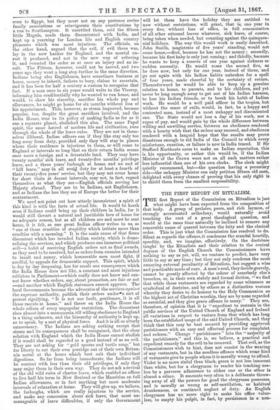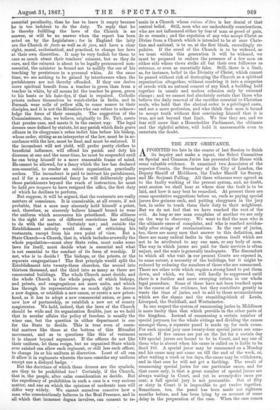THE FIRST REPORT ON RITUALISM.
THE first Report of the Commission on Ritualism is just what might have been expected from the composition of that body. A group of prelates, peers, and rich laymen, of strongly accentuated orthodoxy, would naturally avoid touching the root of a great theological question, and would at the same time naturally be inclined to remove any removable cause of quarrel between the laity and the clerical order. This is just what the Commission has resolved to do. Silent as regards the offence, it condemns the scandal heartily, speedily, and, we imagine, effectively. On the doctrines taught by the Ritualists and their relation to the central dogmas of the English Church the Commissioners have nothing to say as yet, will, we venture to predict, have very little to say at any time ; but they not only condemn the most annoying external peculiarity of Ritualism, but suggest a wise and practicable mode of cure. A man's soul, they decide gravely, cannot be greatly affected by the colour of somebody else's breeches, or, in their own stately and formal diction, " we find that while these vestments are regarded by some witnesses as symbolical of doctrine, and by others as a distinctive vesture whereby they desire to do honour to the Holy Communion as the highest act of Christian worship, they are by none regarded as essential, and they give grave offence to many." They are, therefore, of opinion that it is " expedient to restrain in the public services of the United Church of England and Ireland all variations in respect to vesture from that which has long been the established usage of the said United Church, and they think that this may be best secured by providing aggrieved parishioners with an easy and effectual process for complaint and redress." Change " parishioners " into the " majority of the parishioners," and this is, we believe, a practical and expedient remedy for the evil to be removed. That evil, as the Commissioners wish to hint, does not consist in the wearing of any vestments, but in the needless offence which some kind of vestments give to people whom it is morally wrong to offend. Violet is no more sinful than black, green is not less innocent than white, but for a clergyman to render his teaching use- less by a perverse adherence to either one or the other is almost a crime. It amounts very often to a deliberate throw- ing away of all the powers for good the clergyman possesses, and is morally as wrong as self-mutilation, or habitual drunkenness, or continued neglect of day. An English clergyman has no more right to make his office value- less, to empty his pulpit, in fact, by persistence in a non- essential peculiarity, than he has to leave it empty because he is too indolent to do the duty. To reply that he is thereby fulfilling the laws of the Church is no answer, or will be no answer when the report has been acted on by the Legislature ; for in England the laity are the Church de facto as well as de jure, and have a clear right, moral, ecclesiastical, and practical, to change her laws at their own discretion. It may be very foolish for them to care so much about their teachers' raiment, but as they do care, and the raiment is about to be legally pronounced non- essential, the minister is-bound not to nullify the use of his teaching by persistence in a personal whim. At the same time, we see nothing to be gained by interference when the parishioners are not thereby offended. If they can derive more spiritual benefit from a teacher in green than from a teacher in white, by all means let the teacher be green, green to his boots or his hair-dye, if that is required. Catholic priests reduce themselves to waist-cloths in India, and in Burmah wear rolls of yellow silk, to come nearer to their disciples, and it is not the Ritualists who can refuse to acknow- ledge the force of their example. The suggestion of the Commissioners, due, we believe, originally to Dr. Tait, meets that precise case, and meets it in the easiest way. The legal dresses once defined by statute, let any parish which finds grave offence in its clergyman's robes indict him before his bishop, whose order, sitting as an interpreter of the law, must be in ac- cordance with the law, must be final, and must be enforced. If the incumbent will not yield, will prefer pretty clothes to beneficial influence, will offend his parish and defy his diocesan at one and the same time, he must be suspended until he can bring himself to a more reasonable frame of mind. He cannot be allowed, for a fancy which the law has declared non-essential, to render an entire organization practically useless. The incumbent is paid to instruct his parishioners, and if for a non-essential fancy he will deliberately place those parishioners beyond the reach of instruction, he must be held pro ternpore to have resigned the office, the first duty of which he declines to perform.
But suppose, it will be argued, that the vestments are really matters of conscience. It is conceivable, at all events, if not probable, that a man may sincerely hold himself a priest, and, therefore, as sincerely believe himself bound to wear the uniform which announces his priesthood. His silliness in the sight of men of different convictions has nothing to do with the matter. Certainly not ; and, outside the Establishment nobody would dream of criticizing his vestments, except from his own point of view. But a State Church—a Church, that is, which includes avowedly the whole population—must obey State rules, must make some laws for itself, must decide what is essential and what is not essential to the conduct of its form of worship. If not, who is to decide ? The bishops, or the priests, or the separate congregations ? The first principle would split the Establishment into twenty-three churches, the second into thirteen thousand, and the third into as many as there are consecrated buildings. The whole Church must decide, and the whole Church is the whole people, of which bishops, and priests, and congregations are mere units, and which has through its representatives as much right to decree a new dogma, or establish a new canon, or create a new priest- hood, as it has to adopt a new commercial axiom, or pass a new law of partnership, or establish a new set of county magistrates. We hold, indeed, that the laws of the Church should be wide and its organization flexible, just as we hold that in secular affairs the policy of freedom is usually the wiser one, but the question in either department is one for the State to decide. This is true even of essen- tial matters like those at the bottom of this Ritualist movement, and as to questions like this of vestment it is almost beyond argument. If the officers do not like their uniform, let them resign, but no organized State which ever existed can allow each regiment, or still less each officer, to change its or his uniform at discretion. Least of all can it allow it in regiments wherein the men consider any uniform except one a disloyal badge. - But the doctrines of which these dresses are the symbols, are they to be prohibited too ? Certainly, if the Church, that is, the people, after calm consideration so decide. But the expediency of prohibition in such a case is a very serious matter, and one on which the opinions of moderate men will differ very widely. We cannot ourselves conceive how a man who conscientiously believes in the Real Presence, and in all which that immense dogma involves, can consent to re- main in a Church whose raison d'itre is her denial of that central belief. Still, men who are undoubtedly conscientious, who are not influenced either by fear of man or greed of gain, do so remain ; and the expulsion of any who accept Christ as Divine from a Church which is intended to be at once Chris- tian and national, is to us, at the first blush, exceedingly re- pulsive. If the creed of the Church is to be widened, as we trust within this generation it will be widened, we must be prepared to endure the presence of a few men on either side whose views strike all but their own followers as extreme, or even as essentially false. Still, there is a limit, as, for instance, belief in the Divinity of Christ, which cannot be passed without risk of destroying the Church as a spiritual organization altogether, without resolving it into a congeries of creeds with no natural cement of any kind, a building held together in unsafe and useless cohesion only by external clamps ; and we cannot feel absolutely certain that those who believe the daily renewal of the sacrifice essential to Christian souls, who hold that the clerical order is a privileged caste, and not a mere profession, and who think that man is bound to accept truth without first convincing himself that it is true, are not beyond that limit. We fear they are, and we- fear still more that a Householder Parliament, the ultimate and the rightful arbiter, will hold it unreasonable even to entertain the doubt.































 Previous page
Previous page